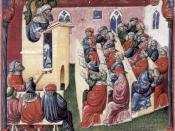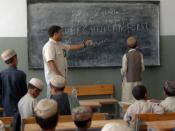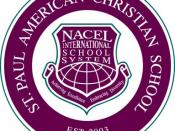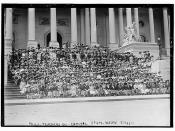In comparing and contrasting ideas that we have discussed so far one comes to mind in which I would like to elaborate on to point out the repercussions of such a problem. It involves the education system the way that America's children are being taught. I will analyze the American education system from a relatively neutral position. This position can also be argued to be not neutral by others, as we have seen in the Feminism and Science essays, but that is another paper. My argument is that children in today's education system are forced too heavily on the texts of science and not enough emphasis is put on critical thinking as well as historical importance in science. As we have discussed, science is taught and has been taught for a number of years through textbooks, which have been accumulated over the years to be adjacent and coherent to the authors understanding of such subjects.
This however is done for a reason I will list later but my overall view is that there are three main problems that follow this procedure. The three problems go as follows.
First, the textbooks used today are compiled of years and years of research and findings and rarely if ever are these texts wrote with a thorough history of how man has came to the conclusion of a theory or paradigm one is studying. The struggle in which science has endured over the years is a very important aspect to a child's learning. And because of this method of teaching, students tend to see only where science is today and not where it has came from. For example, just because I can change oil in my car does not give me the knowledge to understand cars. Rather all I have to show for my knowledge in cars is that I can change my own oil. In order for a child to understand the vehicle of science they must be taught the history of science through numerous philosophical viewpoints. This will enable them to understand how science originated and how it is understood today by a society in which they live.
Secondly, a subtle but very important outcome of modern science and the way it is taught is that students will learn to learn in a way that inhibits their ability to think freely and creatively. Feyerabend claims, and I feel is accurate, is that a child's most genius years are between the ages of 3 and 5. The explanation behind this is that these children think creatively and openly. They have not yet been forced into the education system way of learning. Which tends to be an oppressed view to the curriculum due to the way that these texts from which they learn are wrote and compiled. Because of this way children are taught they end up developing concrete ways of learning material. As well as concrete ways of thinking. Which leads us to ask why is school curriculum in these early years taught this way? In the educational systems defense, curriculum taught this way is an excellent way to teach kids to learn because students learn how to deal with problem solving best this way. When teachers give out homework for the students to complete, they are usually given a set amount of time to complete the assignment. As they complete these assignments they are learning how to solve problems and meet deadlines. They also learn research skills, and study skills with this method of education. And these forms of the texts that they use seem to be guides in doing so.
And thirdly, modern science will continue to suppress students because of the bad habits that follow. I realize that I mentioned earlier that the modern way of teaching shows kids good habits in which they learn special skills. I feel this to be true but on the other hand students will also learn the how not to think with an open mind. An interesting article read in class was supposed to be written by God, saying that "ÃÂI gave you all brains so why don't you use them'. This sarcasm backs up the notion that we are teaching are future generations to not think but rather go along with what is learned from earlier years of education.
Overall the effects of such a system as presented and analyzed here may be a runoff effect of learning, which we all learned from our teachers in those early years. Perhaps teachers and educators teach this way because this is how they were taught to learn as well. If so then this only proves my third point to be factual. What children are taught forge their future in the same pattern in almost every scenario. Granted they learn things as they grow older but as they grow they learn these new understandings from a new perception usually branching off from something they learned earlier but did not understand it in this new way.
Now for perhaps the most important point I need to make is that students today are brought up in a system that they can strive in. This system is set up not only for learning but also for conquering in a sense as well. Let me explain, the education system never changes from grade to grade. Even when one goes on to college the systematic way of studying, taking tests, taking notes, etc"æ is the same. Therefore, students adapt to being good at school and not necessarily good at learning and thinking or problem solving in the real world. Over time students can get really good at school by the way that they subconsciously learned to do the work. For example, often students will hurry through a reading, finish the sheet of questions assigned and turn it in. Only reading the text looking for the answers to the questions they were given for the homework. And not actually reading the text as the teacher assigned for a reason. To further this, the teacher may see that after grading these assignments that most of the students lets say did really well on the questions. So the class then moves on to the next subject, and on, and on, because the teacher feels they are ready.
In order for children to understand and obtain crucial thinking skills, modern science needs to be reconstructed in a way that permits and promotes these qualities for children of all ages because of the narrow and lack of explanations in the curriculum taught through science textbooks. I have pointed out three main arguments against modern science and the way that it is taught today as well as the way it has been taught for years. We need to think freely on our own at times and to an extent inside the classroom and guided towards various possibilities instead of being patterned on how to think by school issued textbooks.





